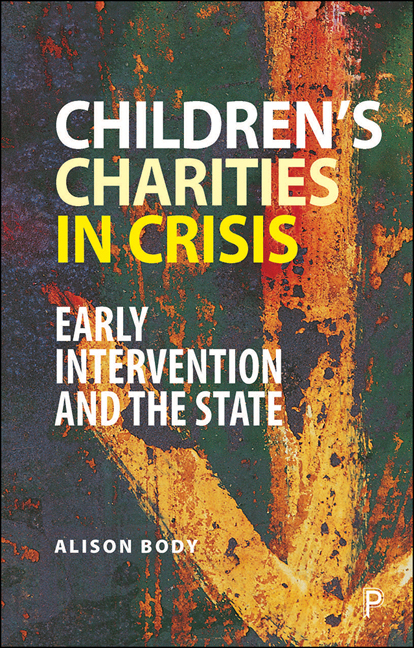Book contents
- Frontmatter
- Dedication
- Epigraph
- Contents
- List of Figures and Tables
- About the Author
- Acknowledgements
- Introduction
- Part I Preventative Services and Children’s Charities: Policy and Paradigm Shifts
- Part II On the Frontline of Early Intervention
- Part III The Lived Realities of Commissioning Children’s Early Intervention Services
- Part IV Concluding Thoughts
- Appendix: Data and Methods: Voices from the Frontline
- References
- Index
2 - Contemporary Preventative Services, Coalitions and the Conservatives
Published online by Cambridge University Press: 04 March 2021
- Frontmatter
- Dedication
- Epigraph
- Contents
- List of Figures and Tables
- About the Author
- Acknowledgements
- Introduction
- Part I Preventative Services and Children’s Charities: Policy and Paradigm Shifts
- Part II On the Frontline of Early Intervention
- Part III The Lived Realities of Commissioning Children’s Early Intervention Services
- Part IV Concluding Thoughts
- Appendix: Data and Methods: Voices from the Frontline
- References
- Index
Summary
In this chapter we explore contemporary children's services, discussing how the persuasive logic of prevention has been adopted in more modern service delivery. Focusing specifically on the early 2010s, we map the shift from the Conservative flagship project of the Big Society, to the renewed localism project of the Civil Society Strategy. The links between the societal hardening of focus, from universal provision to the targeting of preventative services will be delineated, and the role of the voluntary sector in the delivery of these services will be discussed. The aim is to highlight the lived realities of service delivery for children, which will then be discussed over the remainder of this book.
The Big Society to civil society
The Big Society was promoted by the Conservative government as a solution to the financial crisis which had gripped the UK and much of Europe since 2008. In 2009, David Cameron initially outlined the Conservative's vision for the ‘Big Society’ in his Hugo Young Memorial Lecture, controversially presenting Labour as ‘big government’ but still following themes that resonated with the ‘third way’. At that time, Cameron suggested: ‘Because we believe that a strong society will solve our problems more effectively than big government has or ever will, we want the state to act as an instrument for helping to create a strong society … Our alternative to big government is the Big Society’ (Cameron, 2009).
The concept of the Big Society remained confusing. It was an integral part of the Conservative/Liberal Democrats Coalition's plans, on their election in 2010, for public sector service provision retraction and emphasised the voluntary sector and ‘civil society’ delivering public services in a more cost-efficient manner during an economic downturn. For the Conservatives, the Big Society focused on providing answers to the central problems that they argued faced Britain under Labour rule. Citing the financial crisis, decreases in employment and increases in poverty, they argued that Britain was ‘broken’ financially, socially and politically (Evans, 2011). The concept of the Big Society suggested that by supporting civil action and community spirit, the Big Society could mend Britain socially. By finding cheaper alternatives in the delivery of services in the public sector and helping the unemployed back to work the Big Society could mend Britain financially.
- Type
- Chapter
- Information
- Children's Charities in CrisisEarly Intervention and the State, pp. 35 - 60Publisher: Bristol University PressPrint publication year: 2020



